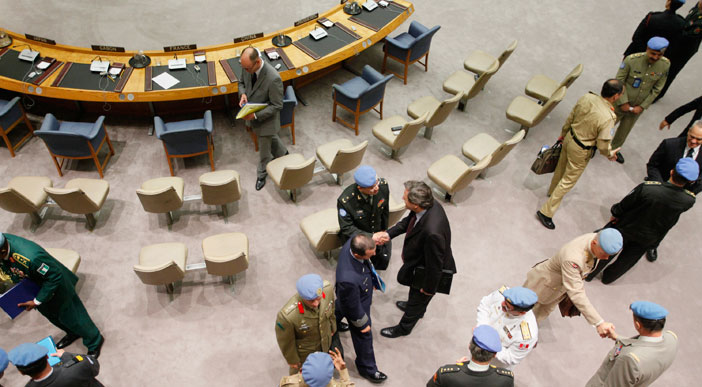 The International Peace Institute (IPI) and the Diplomatic Academy Vienna have put together the first comprehensive analysis of the role of the UN Security Council in the ongoing process of implementing the responsibility to protect (RtoP). This most recent journal issue prepared by IPI and the Diplomatic Academy Vienna features contributions by senior policymakers and experts who participated in a conference co-hosted by the government of Austria, IPI, the Diplomatic Academy of Vienna, and the National Defence Academy in Vienna.
The International Peace Institute (IPI) and the Diplomatic Academy Vienna have put together the first comprehensive analysis of the role of the UN Security Council in the ongoing process of implementing the responsibility to protect (RtoP). This most recent journal issue prepared by IPI and the Diplomatic Academy Vienna features contributions by senior policymakers and experts who participated in a conference co-hosted by the government of Austria, IPI, the Diplomatic Academy of Vienna, and the National Defence Academy in Vienna.
Contributions by Gareth Evans, Edward C. Luck, Susan Rice, Terje Rød-Larsen, Michael Spindelegger, and others in this publication provide an in-depth analysis of the policy, process, and practice of the UN Security Council in protecting populations from genocide, war crimes, ethnic cleansing, and crimes against humanity. The launch of this collection of essays occurs shortly after the adoption of Security Council Resolution 1970(2011) on February 26, 2011 on the situation in Libya, which recalls the responsibility of the government to protect its population and thus echoes paragraphs 138 and 139 of the 2005 World Summit Outcome Document on RtoP.
This collection of essays demonstrates that the Security Council’s role in implementing the responsibility to protect is not limited to taking collective action against mass atrocities (pillar three of RtoP). The publication shows that the Council can also make important contributions to encouraging and helping states exercise their responsibility to protect populations from genocide, war crimes, ethnic cleansing, and crimes against humanity (pillar two of of RtoP). By mandating UN peace operations to support security and justice sector reforms, the Security Council fosters national protection capabilities in states emerging from conflict, which typically face a high risk of relapse into mass violence. When the Security Council mandates peace operations to support the disarmament, demobilization, and reintegration of former combatants it also strengthens the fabric of a postconflict society. By pursuing early engagement and preventive diplomacy the Security Council can encourage governments to address concerns and to mitigate risks before mass atrocities materialize.
The Security Council’s multifaceted contributions to the implementation of the responsibility to protect complement the important roles of the General Assembly, the Human Rights Council, the Peacebuilding Commission, the Secretary-General, and other UN organs. The contributions of the Security Council to the implementation of the responsibility to protect have to occur within the scope of the authority granted to the Security Council by the UN Charter.
The publication was prepared by Christoph Mikulaschek, Senior Policy Analyst at IPI, and Hans Winkler, the director of the Diplomatic Academy of Vienna, which publishes the Favorita Paper journal.
Contributions to the Favorita Paper:
![]() Preface, Michael Häupl
Preface, Michael Häupl
![]() Foreword, Michael Spindelegger
Foreword, Michael Spindelegger
![]() Introduction, Hans Winkler
Introduction, Hans Winkler
![]() Welcoming remarks, Terje Rød-Larsen
Welcoming remarks, Terje Rød-Larsen
![]() The United Nations Security Council and the Responsibility to Protect: Policy, Process, and Practice. Report from the 39th International Peace Institute Vienna Seminar on Peacemaking and Peacekeeping, Christoph Mikulaschek
The United Nations Security Council and the Responsibility to Protect: Policy, Process, and Practice. Report from the 39th International Peace Institute Vienna Seminar on Peacemaking and Peacekeeping, Christoph Mikulaschek
![]() Keynote Address, Susan E. Rice
Keynote Address, Susan E. Rice
![]() Address, Michael Spindelegger
Address, Michael Spindelegger
![]() Taking Stock and Looking Ahead – Implementing the Responsibility to Protect, Edward C. Luck
Taking Stock and Looking Ahead – Implementing the Responsibility to Protect, Edward C. Luck
![]() The Responsibility to Protect: Consolidating the Norm, Gareth Evans
The Responsibility to Protect: Consolidating the Norm, Gareth Evans
![]() Remarks on Early Engagement and Preventive Diplomacy by the UN Security Council, Thomas Mayr-Harting
Remarks on Early Engagement and Preventive Diplomacy by the UN Security Council, Thomas Mayr-Harting
![]() Peacemaking in Burundi – A Case Study of Regional Diplomacy Backed by International Peacekeeping and Peacebuilding, Adonia Ayebare
Peacemaking in Burundi – A Case Study of Regional Diplomacy Backed by International Peacekeeping and Peacebuilding, Adonia Ayebare
![]() The Responsibility to Protect and Protection of Civilians: The Human Rights Story, Mona Rishmawi
The Responsibility to Protect and Protection of Civilians: The Human Rights Story, Mona Rishmawi
![]() MONUC and Civilian Protection in the Democratic Republic of the Congo, Alan Doss
MONUC and Civilian Protection in the Democratic Republic of the Congo, Alan Doss
![]() MONUC as a Case Study in Multidimensional Peacekeeping in Complex Emergencies, Patrick Cammaert
MONUC as a Case Study in Multidimensional Peacekeeping in Complex Emergencies, Patrick Cammaert
![]() MINURCAT’s Role in Supporting Chad in Attaining the Objectives of the Responsibility to Protect, Rima Salah
MINURCAT’s Role in Supporting Chad in Attaining the Objectives of the Responsibility to Protect, Rima Salah
From the 39th Vienna Seminar, held on June 14-16, 2009:
![]() Program
Program
![]() List of Participants
List of Participants
![]() Background Paper, Edward C. Luck
Background Paper, Edward C. Luck
You can order a hard copy of the Favorita Paper on the website of the Diplomatic Academy of Vienna.
You may also be interested in IPI’s recent publication on a related topic: The United Nations Security Council and Civil War: First Insights from a New Dataset by James Cockayne, Christoph Mikulaschek, and Chris Perry (September 2010)







